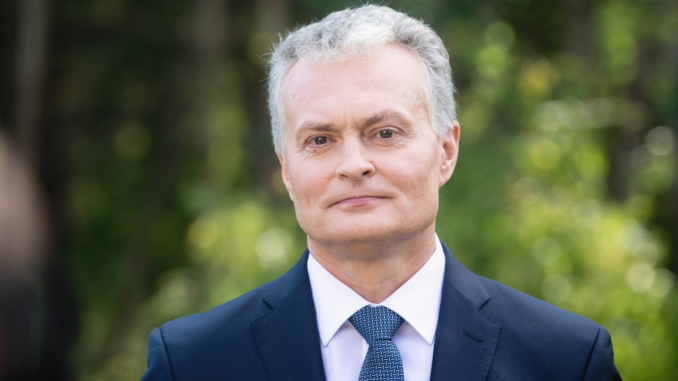
The protracted dispute between the ruling Conservatives and President Gitanas Nausėda on representation at the European Council might have roots somewhere altogether different. Sources say that the conflict began when the ruling bloc began forming a cabinet, lrytas.lt reported.
Important position
According to Lietuvos Rytas sources, tensions began between the president and the Conservatives when the cabinet formation process began – the president wanted to see Asta Skaisgirytė, who now works as his advisor, as the minister of foreign affairs.
“I have information, which could confirm this, but I did not participate in the meetings. Overall, the president is inclined to believe that he handles foreign policy unilaterally, matches that code of conduct,” Ž. Pavilionis says.
According to sources, there were discussions that if the president doesn’t yield in regard to the position of minister of foreign affairs, the Conservative party chairman Gabrielius Landsbergis could become the Seimas speaker. However, the Liberals opposed this, refusing to yield the position.
Lithuanian Farmer and Greens Union (LVŽS) member and shadow minister of foreign affairs G. Surplys said during the show 24/7 that he believes that there’s more at play in this case.
“From the very beginning of term, we, the LVŽS, have had suspicions that the TS-LKD have a plan for a complete takeover of power – this spans not only the games over who will board the plane and fly to the European Council summits but also ideas to abolish the direct mayoral and presidential elections, as well as the single-mandate electoral districts.

It is good to see that the Conservatives are gradually reaching an understanding that they are not ruling a state under the rule of law alone and are instead withdrawing from such aggressive positions. However, this mess with the attempt to push away the president from his constitutional remit in foreign policy is more akin to a plan of how to take over government – perhaps not permanently, but for a long time and enter all of its layers,” G. Surplys mused.
A feast during the plague?
Ž. Pavilionis ironically remarked that if he were thinking about foreign policy as broadly as G. Nausėda, then either he or Gabrielius Landsbergis would have to take the seats of all Seimas committee chairpersons or all minister seats, including those in the ministries of social security and labour, the environment and agriculture.
According to the Conservatives MP, the Constitution outlines that the president represents the country in foreign policy and bilateral relations during summits, but the European Union’s affairs are the prerogative of the prime minister and cabinet.
Ž. Pavilionis believes that the president’s participation in European Council sessions where matters of unemployment and poverty are handled or when the president looks to participate in upcoming negotiations on climate change where key indicators for Lithuanian companies will be set are, according to the Conservatives MP, “legal nihilism.”
According to the Seimas Foreign Affairs Committee chairman, when the president’s advisor describes the Conservatives’ attempts to raise this question as “anti-state activities,” he believes that “you could say that it is an attempt against the foundations of democracy. It is akin to A. Lukashenko and V. Putin’s jargon.”
Furthermore, Ž. Pavilionis claims that G. Nausėda departing for the informal European Council session in Portugal on Friday and Saturday, which included a delegation of thirteen persons (two of the president’s senior advisors, an ambassador, three advisors to the head of state, a specialist from the Protocol Section, a photographer, a camera operator and three security staff) was a waste of taxpayer money.
“Informal sessions are notable for how, in essence, only the leaders participate – they are separated from the delegation so that the delegation wouldn’t influence them and so that they could find agreement on sensitive questions alongside other leaders.
Meanwhile, the delegation has some wine, drinks coffee, basks in the sun. Take note how two powerful, vastly more affluent states than us – Germany and the Netherlands – didn’t even send a representative and chose to participate remotely,” Ž. Pavilionis emphasised.
“A delegation of thirteen in the midst of a plague. The most ironic in all this is that it is social questions and exclusion that is being discussed all the while money is taken from my and Mr Surplys’ wallets to be spent on wine in Porto,” he added.
Threats?
Meanwhile, G. Surplys wondered why Prime Minister Ingrida Šimonytė could not visit the president and share the representation on the basis of remits.
“Why should the European Affairs Committee be employed, which is trying to foist her onto the plane by way of artificial, under the rug agendas, thus placing even her into an inconvenient position? Reach agreement at the top – why involve us and create a trivial problem?” the “Farmer” questioned.
However, Ž. Pavilionis emphasises that agreement wasn’t reached.
“The problem is that discussions have been held with the president several times and the president’s answer, I. Šimonytė said it herself, was a very harsh “no.” Thus, if such is the response at the highest level, then don’t you worry, we will defend the Constitution and the law in Seimas. If the president won’t abide by them, we will speak openly, publicly and will be completely unafraid,” Ž. Pavilionis said.
Does this mean that the Conservatives are considering impeachment?
“We are currently trying to talk politically. That’s the purpose of the Foreign Affairs Coordination Council, perhaps we can bring it up there if he says that he isn’t spoken to. […]
We aren’t talking about any other disciplinary matters where the president reminds us that if we do not heed him, then he will apply not only political but also other accountabilities. What is this about? Imprisonment? These are purely Eastern dictatorial declarations,” Ž. Pavilionis spoke.


Be the first to comment